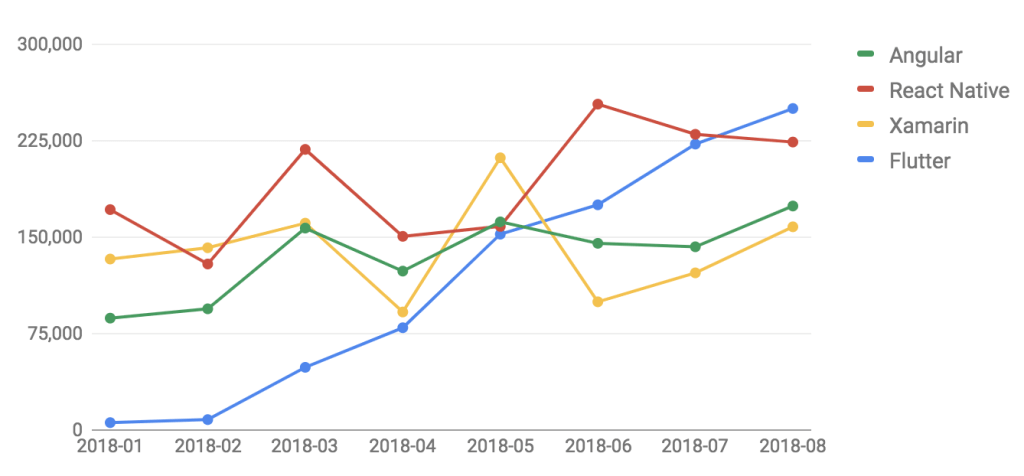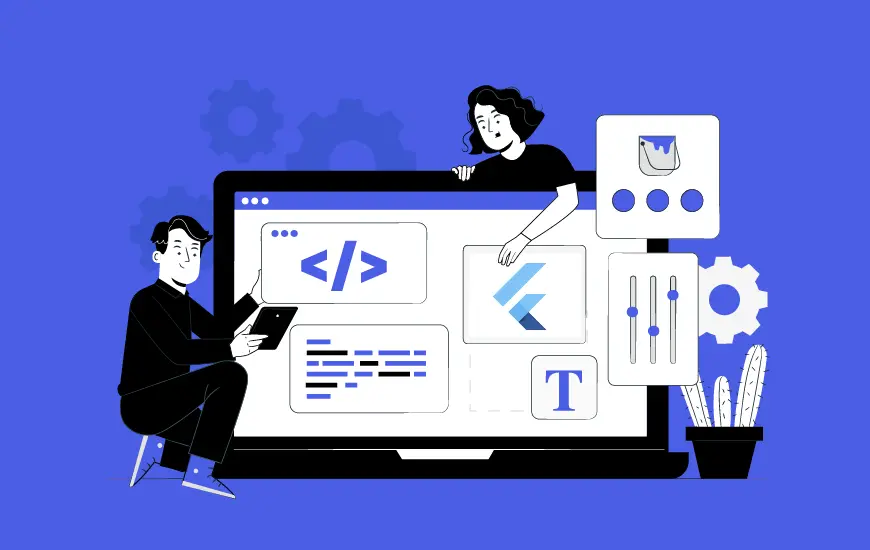- Why Should Startups Choose Cross-Platform App Development
- Why Should Startups Choose Flutter
- 1. Flutter mobile app development helps overcome the many known limitations of taking the cross-platform route
- 2. The developers’ productivity increases by ten-fold
- 3. Flutter is hands-down a powerful design experience
- 4. The possibility to use Firebase as the backend is an instant startup seller
- 5. The wew google operating system, Fuchsia, will be using Flutter
- 6. Faster application development with hot reload
If there is one thing that Flutter, ever since it was first announced in May 2017 has stood upon, it is the fact that it is the rightful mobility powering partner of startups.
Through this article, you will get the startup inclined answer to Why Choose Flutter.
At the center of it, Flutter is a blend of all the best Google ideas and technologies, a blend which has resulted in the creation of a powerful mobile framework.
Based on Dart, the in-house Goole Programming Language, Flutter comes powered with a number of features that have never been seen before in a cross-platform ecosystem. The development tool combines the best of Skia graphics library and Material Design – leading to the creation of mobile apps for startups that allow lightning speed transitions and come packed with design elements that are known to fit right into the native self of both Android and iOS.
While we have already taken a deep dive into the features that make Flutter ideal for cross-platform development, let us concentrate on why is flutter good for startups that work on a budget and have a packed go-to-market time.
But before we go on to answer why choose Flutter for mobile app startups, let us look at why its superset – Cross-Platform App Development is a preferred choice for startups.
Why Should Startups Choose Cross-Platform App Development
When we talk about mobile app development, there are two options that both enterprises and startups are asked to choose from – Native Applications and Cross-Platform Mobile Apps.
While on one side, Native apps are those that are made specifically for one platform – either Android or iOS, there are Cross-Platform apps that are made to run on both Android and iOS in one go.
There are a number of benefits of flutter app development that come attached to the possibility of developing a common app that would get live on both iOS and Android at the same time –
- Lowered Developmental Effort – Singe the developers have to work on a single codebase and not make two versions of the app, the development time it takes to make a cross-platform app is a lot faster.
- Lowered Testing Time – Instead of checking the app performance on not two individual platforms with both entailed with fifties of devices and operating systems, QA experts have to test only one version of the application.
- Lowered App Development Cost – What comes attached with low development and testing effort is lowered app development cost as the resource time allocation is lower in case of cross-platform app development
- Faster time to market – Since the mobile app gets developed with low developmental efforts and the testing time is also fairly low as compared to its native app counterparts, entrepreneurs are able to launch the app a lot faster in the market, making it easy for them to enjoy the perks of being an early-bird.
Now, even amidst all these benefits, there are reasons why entrepreneurs and startups are still more inclined towards Native app development, taking the iOS first Android later route, instead of investing in a development process that would get them on both Android and Apple.
There are two reasons behind this – A. The cross platforms are slow as they run through the code interpreter in place of being compiled Native ARM code. And B. The apps do not look and work as a native app because they carry completely different widgets or buttons.
Both the reasons that are also the ONLY reasons keeping startups away from are also the ones that Flutter resolves with ease – an event, which in an ideal world should have made Flutter for a startup a commonality.
Even after proving itself, through its powerful technological mechanism, there have been a significant amount of doubts surrounding partnering with a Flutter app development company in the mind of businesses.
The one factor that has always made brands conscious about investing in flutter app development company in New York is that the framework is new and not many brands are backing it up.
The constant feature updates and greater number of businesses getting associated with the framework, app development using flutter has become synonymous to powerful, scalable mobile applications.
But, the Flutter 1.0 Live event held a few days back reminded us of the associations that Flutter has been able to create at the back of its ability to create powerful, scalable mobile applications.
With brands like Alibaba, Tencent, and Hamilton Musical basing their app development process on Flutter and companies like Firebase, Square, etc extending their partnership to make the ecosystem more strong and reliable, the doubt that the developers, establishments, and startups alike had towards Flutter’s acceptance in the market has vanished to a great extent.
And in return, the interest growth tangent that Flutter development services have formed for itself is on a constant rise.

Now that we have seen how Flutter for mobile app startups has started showing its dominance as a robust cross-platform tool and seeing how it has proved its dominance in the Flutter vs React Native debate, it is time to look into the reasons which validate the benefits of Flutter for mobile app startups.
Why Should Startups Choose Flutter
Here are the major startup inclined benefits that your startup can avail with the Flutter association –
1. Flutter mobile app development helps overcome the many known limitations of taking the cross-platform route
It has been a long wish desire of the mobile app developers to create a truly bespoke cross-platform product that is usually restricted to native app development.
Even with popular tools and frameworks like React Native and Ionic present in the market, the reality is that the user experience difference between both Native and Cross-Platform Apps are so stark that it is a complete disappointment.
However, Flutter is a pleasant difference. Using the native UI elements of both Android and iOS, Flutter app development brings something to the table that the whole community has been longing for – A true code once approach that creates a powerful native experience.
2. The developers’ productivity increases by ten-fold
One of the most prominent benefits that we have seen becoming the reason behind why should startups choose Flutter is specific to the productivity that rises in our developers when we use Flutter. The driving force of this heightened increase in productivity comes from the ‘stateful hot reload’ feature that is one of the major selling points of Flutter. Allowing the developers to see the effect of a change in code happening in real-time, Flutter removes the need to recompile, something that brings the time of mobile app development down by manifold.
3. Flutter is hands-down a powerful design experience
The partnership between Material Design and Flutter has given birth to a mechanism that promises a powerful UI experience. It helps in creating a smooth, zero learning curve experience which you usually only expect from native mobile applications.
Flutter comes power-packed with customized widgets for both Android and iOS, so what you get is a ‘Feel’ of a native application. The widget catalog that Flutter comes with is the widest ever seen in any cross-platform tool.
4. The possibility to use Firebase as the backend is an instant startup seller
Firebase, backed by Google, provides out of box support for cloud storage, real-time databases, hosting, cloud functions, authentication amongst a lot of other things. With Firebase, the infrastructure becomes serverless, scalable, and redundant. Long story short, with the adoption of Flutter for startups, companies no more have to invest their resources and time towards backend development.
It is also very easy for developers to combine Firebase in your mobile apps built with Flutter with an automation tool needed for your release and development process, like Fastlane, which allows the team to achieve constant delivery.
5. The wew google operating system, Fuchsia, will be using Flutter
Although the power of Fuschia is yet to be revealed to the world, we do know that it would rely heavily on Flutter. The next to come operating system will bring together Chrome and Android while being the heart of millions of internet of things devices which we expect to come into business existence in the time to come. There are many market researchers who believe that Fuschia will be the base of virtual and augmented reality.
Now, irrespective of what Fuschia looks like, the impact that it is going to create is uncontested. And the fact that it is based on Flutter makes the cross-platform tool very significant too.These five present and futuristic benefits or USPs make Flutter for startups app development an event that is demanded by every app entrepreneur who is looking for an app that is not just backed by bespoke design but also helps save on the development time while being futuristic.
6. Faster application development with hot reload
Flutter’s hot reload feature helps developers easily and quickly experiment, create UI, add-in features and debug the apps in real-time. The feature reflects the changes you make in coding in real-time. It also helps reflect updates in the present state of application and enables developers to continue code execution in real-time.
Now that it has been validated that Flutter for mobile development is a profitable move for startups – faster go-to-market and low developmental cost – what are you waiting for? People are making use of this opportunity from across the globe and are hiring development companies in the USA, for e.g., Flutter app development company in New York, to start their powerful mobility journey.



How to successfully build a Flutter web app?
In December 2018, when Google introduced Flutter, an open-source multiplatform application framework, it took everyone by storm. Businesses, along with programmers and developers from all across the globe, welcomed the technology with open arms, quickly adapting to flutter app development to deploy high-performance, engaging applications. As a result, today, there are more than 1 million…

How to Develop a Chat App in Flutter With Firebase?
The marketplace for chat applications is dominated by a bunch of big players, yet continually advancing technologies and user needs set out open doors for new messages and applications to acquire a portion of the market share. It is not necessary for a new chat app in Flutter with Firebase to clash with WhatsApp, either…

Guide for Developing Startup Mobile App with Flutter
The open-source Flutter SDK is a Google UI toolkit that creates attractive, natively compiled mobile apps, from a single codebase. With apps being downloaded and used by millions of people in a rapid way, the mobile app development is skyrocketing. There are many companies that are making use of this trend and contributing to the…















